
BARBARA DEBOUT/AFP or licensors
By Rédaction Africanews with AP
The Protestant Council of Rwanda has directed all health facilities run by its members to stop carrying out all abortions.
The council’s decision earlier this month described abortion as a sin, echoing the stance of Rwanda’s more widely followed Catholic Church but conflicting with the East African country’s law which permits abortions for specific reasons.
The statement signed by 26 Protestant religious organizations instead called on parents to “guide” their daughters to seek abstinence until marriage.
Abortion previously was illegal in Rwanda, with a prison sentence for anyone who had an abortion or helped in terminating a pregnancy. But the law was changed in 2018 to say abortion is allowed in cases such as rape, forced marriage, incest or cases where pregnancy poses a health risk. The law requires that abortions be carried out only after consultations with a doctor.
“For us, we have our beliefs, and our beliefs cannot be taken away by the law. We are not opposing the law, but our belief does not allow us to support abortion,” Laurent Mbanda, the head of the Anglican Church in Rwanda, told The Associated Press.
He said the best way the council’s member health facilities can handle abortion cases is to make referrals to other hospitals.
The decision affects about 10% of Rwanda’s largest health facilities. The Catholic church owns 30% of the country’s health centers, most of them in rural areas, Cardinal Antoine Kambanda, the head of the church in Rwanda, told the AP.
Rwanda’s government views the Protestant Council’s decision on the sensitive matter as “undesirable,” an official from Rwanda’s health ministry told the AP. The official spoke on condition of anonymity because they were not authorized to speak publicly.
Some human rights groups urged the Protestant Council to reconsider.
“The Protestant church stance is likely to alienate their followers and (make them) seek other alternatives like unsafe abortions that can risk the woman and can cause death. It is better to allow women to seek these services in their hospitals to save life,” said Aflodis Kagaba, executive director of Health Development Initiative.
Sylvie Nsanga, a prominent women’s rights advocate, condemned the religious stance, describing it as “a disappointment.”
Issues of sexual and reproductive health often face debate in the largely conservative country.
Last year, parliament rejected a bill proposed by some members of civil society that would have allowed girls aged 15 to 18 access to contraceptive services in the interest of curbing teenage pregnancies. Some Rwandan lawmakers, however, argued that the bill instead might give teenage girls a “green light” to be promiscuous.
UNECA projects Africa’s economy to reach $1,977.6bn by 2030 through renewable energy
The United Nations Economic Commission for Africa (UNECA) has projected Africa’s economy to reach $1,977.6 billion by 2030 through the continent’s use of renewable energy.
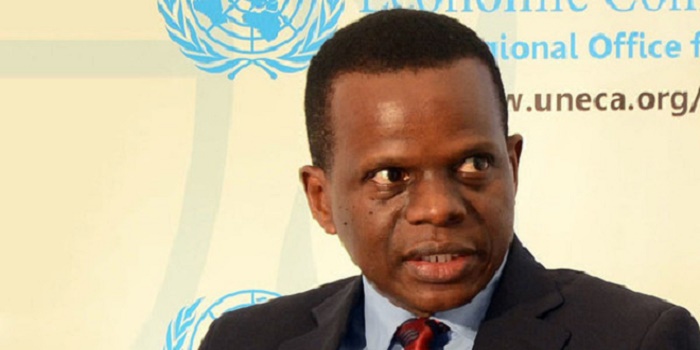
Mr Antonio Pedro, the Acting Executive Secretary, UNECA, said this at the Fifth African Science, Technology and Innovation Forum in Niamey, Niger, on Sunday, February 26, 2023.
The theme of the forum is: “Accelerating Development and Diffusion of Emerging Technologies for a Green, Inclusive and Resilient Africa’’.
“One key opportunity for us lies in the renewable energy market. The value in this market in 2020 was estimated at $881.7 billion and is projected to reach $1,977.6 billion by 2030.
“A 10 per cent share can easily add $200 billion to Africa’s economy.’’
Pedro said another opportunity Africa should not miss out on was the global digital economy.
He said the global digital economy was estimated at about $14.5 trillion, with about 60 per cent of the global Gross Domestic Product (GDP) now depending on digital technologies.
“Initiatives such as the African Trade Exchange (ATEX), which have been conceptualised by ECA and now fully operational under Afreximbank, can connect African entrepreneurs to the global marketplace more effectively.
“There are already many examples of transformative uses of technologies for this purpose across our continent.’’
He gave examples of sustainable development through the Sustainable Development Goals (SDGs) several African countries were involved in to develop their economies.
“In support of SDG 6 – Ensuring access to water and sanitation for all in rural part of Arusha, Tanzania, a nanotechnology-based, low-cost water purification system is serving thousands of lives and creating hundreds of jobs for people.
“To facilitate access to affordable and clean energy, SDG 7, SOLEKTRA International has installed 100,000 solar street lamps and 1,200 solar micro-grids in 15 various countries bringing electricity to many for the first time.
“Various car-hailing services have cut down waiting time, enhanced transparency, and reduced cost of travel across African cities.
“Similarly in 2022, 11,200 bags of ground coffee were sold in a mere one second on the Alibaba E-Commerce platform, to name just a few examples.
“These are just some examples of real solutions that can accelerate the achievement of the SDGs.’’
Pedro, however, said Africa needed to strengthen the enabling environment through informed policies, increase investment in the research and development process, and harness the support of the private sector more effectively.
He said Africa should be at the forefront of a green transformation to accelerate growth, diversify economies and deliver on the SDGs and Agenda 2063.
Pedro further said UNECA was committed to supporting the transformation of Africa in its development process.
By Temitope Ponle
UN launches solar mini-grids program to increase access to energy in Somalia
ByXINHUA
The United Nations Development Programme (UNDP) and Somalia have launched an ambitious solar minigrids program to increase access to electricity in the country.
UNDP Resident Representative in Somalia Jocelyn Mason said in a joint statement released Monday evening in Mogadishu, the capital of Somalia, that 65 percent of people don’t have access to electricity in Somalia. The Somalia project of the Africa Minigrids Program (AMP) will bring new development opportunities to rural communities while contributing to putting the country on a sustainable development path.
“Yet the appalling drought we are experiencing now only underscores the importance of sustainable, green energy, and Somalia has the potential for plentiful supplies of solar and wind energy,” Mason said.
The program, which is funded by the Global Environment Facility (GEF), the Africa Minigrids Program, is a regional energy access program led by UNDP in partnership with Rocky Mountain Institute (RMI), a leading think tank based in Colorado that monitors and projects energy trends worldwide, and the African Development Bank.
The AMP works with 21 countries in Sub-Saharan Africa to promote scaled-up investments in solar minigrids to increase access to sustainable, affordable energy while supporting climate action.
The UNDP said the project will start with pilot projects to demonstrate the viability of minigrids hybridization, which will provide electricity to 66,670 people while avoiding nearly 30,000 tonnes of carbon dioxide equivalent (tCO2eq) direct emissions.
This will be the first step of the AMP approach in the country, which aims to catalyze a larger, durable transformation of the country’s energy system which will help the country close its energy access gap while enabling a 594,000 tCO2eq of indirect greenhouse gas emissions mitigation.
Jama Taqal, Somalia’s minister of Energy and Water Resources, said the program will increase access to clean energy and improve service delivery.
President Joao Lourenço inaugurates Angola’s satellite control centre
AFP
Angolan President João Lourenço on Friday inaugurated the country’s first satellite control centre. Its main task is to monitor the activity of the satellite “ANGOSAT 2”.
The southern African country had in October launched the main satellite with the help of Russia
The inauguration took place at Funda area within Luanda, the capital city of Angola and fully equipped with technical and technological means.
“With the launch of this satellite and its commissioning, Angola will win in all services, so we will improve our telecommunications and our social communication and will also benefit from this important project,” said President João.
“Therefore, further investments to ensure that our telecommunications contribute to the development of the country and the services of our economy, not just of Angolan society, will continue to be made, and it has been said here that in terms of fibre optics and therefore cable transmission and investment that we are making today to connect Angola to the neighbouring country, specifically the DRC,” said President João.
According to what was revealed, the Satellite Mission and Control Center is an intelligent infrastructure with multiple engineering advantages, capable of guaranteeing the tracking, monitoring and operation of satellites, in this case the ANGOSAT-2.
In December 2017, Angola launched its trial satellite Angosat-1 alongside the Russian rocket, but Moscow announced it had lost control of it as soon as it entered orbit.
Uganda agrees oil exploration deals with two firms including Australia’s DGR Global
A cabinet meeting on Monday had approved the signing of an agreement with DGR Energy Turaco Uganda Limited, owned by Australia’s DGR Global, for the Turaco exploration area
Elias Biryabarema, Reuters News
January 12, 2023

Reuters Images
KAMPALA – Uganda’s cabinet has agreed for the energy ministry to sign production-sharing agreements (PSA) for two oil exploration blocks with two oil firms, including a unit of Australia’s DGR Global, the government said on Thursday.
A cabinet meeting on Monday had approved the signing of an agreement with DGR Energy Turaco Uganda Limited, owned by Australia’s DGR Global, for the Turaco exploration area, according to a statement issued by Godfrey Kabbyanga, a junior information minister.
The 637-square kilometre exploration area is located in Uganda’s Albertine Rift basin near the border with Congo. A different unit of DGR Global already owns an exploration property in the area, Kanywataba, which it acquired in 2017.
The second deal is for Uganda’s state-owned Uganda National Oil Company (UNOC), and covers the Kasuruban exploration area that stretches over 1,285 square kilometres, according to the statement.
Uganda first discovered commercial reserves of crude oil in the Albertine Rift basin in 2006 and officials say first oil will be pumped out of the ground in 2025.
The two exploration areas were part of five blocks Uganda auctioned in a licensing round launched in 2019.
The firms will initially get two-year exploration licences for the blocks, the statement said.
(Reporting by Elias Biryabarema;Editing by Elaine Hardcastle)
Big change for Eskom and other state companies in South Africa
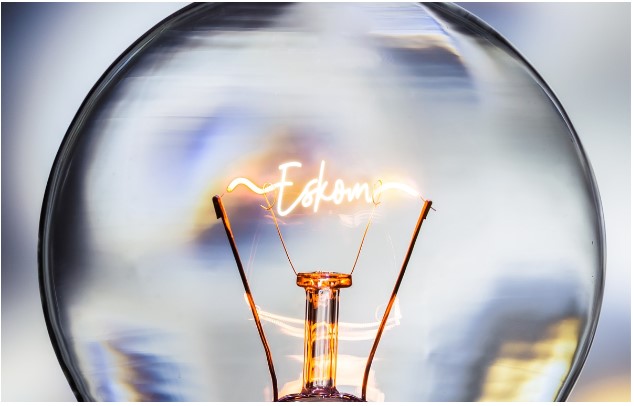
South African President Cyril Ramaphosa said the energy department will take over responsibility for overseeing state utility Eskom Holdings SOC Ltd., which has been failing to meet the nation’s power demand since 2008.
The change will be in line with a resolution adopted by the governing African National Congress at its national conference last week, which specified that state companies operating in specific economic sectors should be overseen by the relevant government departments.
That could potentially signal a dissolution of the Department of Public Enterprises, which oversees Eskom, logistics company Transnet SOC Ltd. and several other entities.
“It is a clear mandate from the conference,” Ramaphosa told reporters at a media event in Johannesburg on Monday. “The resolution will be implemented,” and the government will decide how and when it will be done, he said.
Eskom, which supplies more than 90% of South Africa’s electricity, has been at the epicenter of a national energy crisis, because its old and poorly maintained plants can’t generate adequate power to meet demand. It subjected the country to a record 205 days of rolling blackouts last year, which stymied economic growth and investment.
The government has already announced plans to split the nearly century-old company into three units and take over part of its debt to try and make it financially sustainable.
Public Enterprises Minister Pravin Gordhan has prioritized anti-corruption measures at Eskom and defended outgoing Chief Executive Officer Andre De Ruyter.
A change in the oversight of the company may raise concerns among some investors as Gwede Mantashe, the energy minister, has been opposed plans to transition the economy to green energy — even though Ramaphosa advocates doing so — and been a vocal critic of De Ruyter’s performance.
Several previous resolutions taken years ago by the ANC are still work in progress, and Ramaphosa warned that the party’s latest policy decisions will take time to implement.
“Things in government move very slowly, I have learned,” he said.
Twitter users vote to oust Elon Musk as CEO
AFP , Tuesday 20 Dec 2022
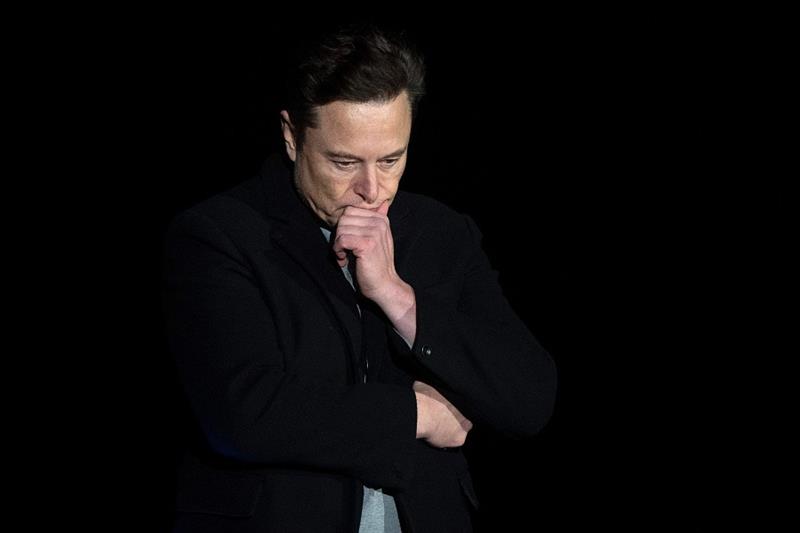
A total of 57.5 percent of more than 17 million accounts voted for him to step down. Musk, who also runs car maker Tesla and rocket firm SpaceX, has not yet reacted publicly to the results.
“The question is not finding a CEO, the question is finding a CEO who can keep Twitter alive,” the South African-born billionaire tweeted before the vote closed.
In a response to another tweet, he added: “No one wants the job who can actually keep Twitter alive. There is no successor.”
Musk has fully owned Twitter since October 27 and has repeatedly courted controversy as CEO, sacking half of its staff, readmitting far-right figures to the platform, suspending journalists and trying to charge for previously free services.
Analysts have also pointed out that the stock price of Tesla has slumped by one-third since Musk’s Twitter takeover. The share price briefly rallied by 3.3 percent on Monday before fading.
“It’s hard to ignore the numbers since [the Twitter] deal closed,” tweeted investment expert Gary Black, saying he reckoned Tesla’s board was putting pressure on Musk to quit his Twitter role.
In discussions with users after posting his latest poll, Musk renewed his warnings that the platform could be heading for bankruptcy.
“Won’t happen again”
Resorting to Twitter’s polling feature has been a favorite strategy of Musk’s to push through policy decisions, including the reinstatement of the account of former president Donald Trump.
Paris-based Reporters Without Borders, which defends press freedom around the world, said the polls were a “crude and cynical” ploy.
“These methods appear to be democratic procedures, but in reality they are… the opposite of democracy,” said the group’s head, Christophe Deloire.
Unpredictable entrepreneur Musk posted his latest poll shortly after trying to extricate himself from yet another controversy.
On Sunday, Twitter users were told they would no longer be able to promote content from other social media sites.
But Musk seemed to reverse course a few hours later, writing that the policy would be limited to “suspending accounts only when that account’s *primary* purpose is promotion of competitors.”
“Going forward, there will be a vote for major policy changes. My apologies. Won’t happen again,” he tweeted.
The attempted ban had prompted howls of disapproval and even bemused Twitter cofounder Jack Dorsey, who had backed Musk’s takeover.
Dorsey questioned the new policy with a one-word tweet: “Why?”
“Perfect storm”
Musk has generated a series of controversies in his short reign, one which analyst Dan Ives from Wedbush described as a “perfect storm.”
He noted that “advertisers have run for the hills and left Twitter squarely in the red ink potentially on track to lose roughly $4 billion per year.”
Shortly after taking over the platform, Musk announced it would charge $8 per month to verify account holders’ identities, but had to suspend the “Twitter Blue” plan after an embarrassing rash of fake accounts. It has since been relaunched.
On November 4, with Musk saying the company was losing $4 million a day, Twitter laid off half of its 7,500-strong staff.
Musk also reinstated Trump’s account — though the former US president indicated he had no interest in the platform — and said Twitter would no longer work to combat Covid-19 disinformation.
In recent days, he suspended the accounts of several journalists after complaining some had published details about the movements of his private jet, which he claimed could endanger his family.
Employees of CNN, The New York Times and The Washington Post were among those affected in a move that drew sharp criticism, including from the European Union and the United Nations.
Washington Post executive editor Sally Buzbee said the suspension of journalist Taylor Lorenz’s account “further undermines Elon Musk’s claim that he intends to run Twitter as a platform dedicated to free speech.”
Some of the suspended accounts have since been reactivated.
On Monday, the head of the European Parliament, speaker Roberta Metsola, sent a letter to Musk inviting him to testify before the legislature, her spokesman said.
The parliament has no power to compel Musk to turn up, and his response was not immediately known.
Microsoft targets internet expansion in Africa, longer-term cloud adoption

Dec 14 (Reuters) – Microsoft Corp (MSFT.O) aims to secure internet access for 100 million more people in Africa by 2025, teaming up with a satellite provider and setting the stage for longer-term cloud adoption, its President Brad Smith told Reuters.
The software maker has long pushed to bring more people online, playing the role of facilitator among telecoms and electricity providers, governments and non-profits. Since 2017, it helped widen connectivity for 50 million people, including nearly 10 million in Africa, under its so-called Airband initiative.
Now, Microsoft is tapping satellite technology for the program for the first time, aiming to reach remote areas that have had little connectivity. In news pegged to the U.S.-Africa Leaders Summit, Microsoft said Wednesday it is working with Viasat Inc (VSAT.O) to expand access in Nigeria, the Democratic Republic of the Congo and other countries globally.
Smith said the effort was “building a new market for access to the internet, for the use of the cloud, for the power of AI, the ability to harness data. All of these things connect with our business.”
He declined to state Microsoft’s financial commitment to Airband but said money “is in some ways the least important part of our contribution” relative to its growing partnerships and helping others make sustainable investments.
Africa, he said, represented a burgeoning talent pool in contrast to declining population growth elsewhere. Microsoft now has more than 500 engineers in Nairobi and more than 200 in Lagos, he said.
Reporting By Jeffrey Dastin in Palo Alto, Calif.; Editing by Kenneth Maxwell
Sheikh Mohammed announces major project for Dubai’s countryside
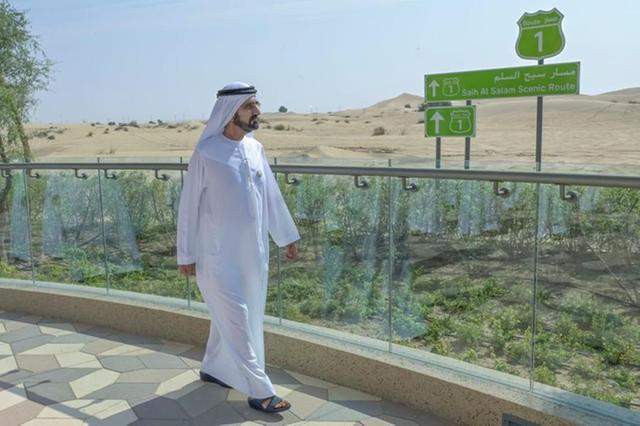
Staff Writer, Khaleej Times
The Dubai Ruler has approved a comprehensive plan to develop the emirate’s countryside into touristic destinations. The development plan includes a first-of-its-kind 100km scenic route, natural reserves and areas to practise desert sports.
The plan encompasses a 2,216-sqkm area in areas like Lehbab, Aweer and Faqaa, among others, according to a tweet by His Highness Sheikh Mohammed bin Rashid Al Maktoum, Vice-President and Prime Minister of the UAE and Ruler of Dubai.
“We have the most beautiful city in the world. Our next goal is to make the emirate’s countryside among the most enjoyable and beautiful,” said Sheikh Mohammed.
Photos he shared with the tweets showed helicopter tour sites, a scenic route with a convoy of camels and greenery and lakes carved out of the desert.
A plan to transform Dubai’s charming countryside into cultural, tourist and environmental destinations was first announced back in May 2022.
According to the Dubai 2040 Urban Master Plan announced last year, wildlife sanctuaries and natural rural areas will constitute 60 per cent of the total area of the Emirate.
Nigerian start-up uses tech to help the visually impaired
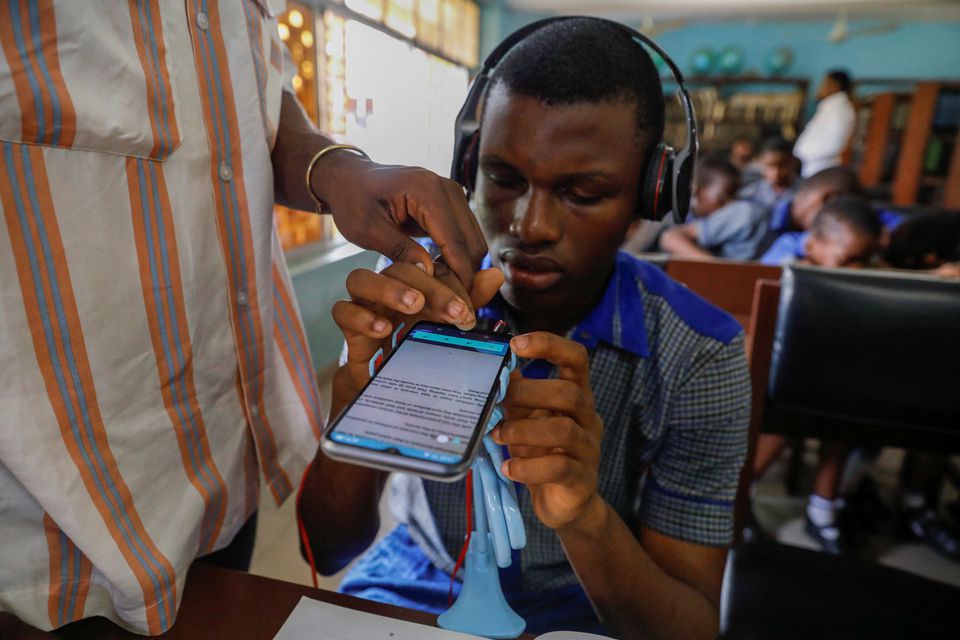
By Reuters • Updated: 24/11/2022 – 11:06
LAGOS – A Nigerian start up called Vinsighte is using technology to assist the visually impaired, with several products including “smart” reading glasses that convert text to audio.
About 15.3% of the world’s blind population resides in Africa, according to the World Health Organization, where they often lack the resources and support needed to succeed in school and everyday life.
“I wanted to just try and see if we could build something that could solve the problem and that was where it all started,” said Vinsighte CEO Kolawole Tomi.
The company distributes its products to schools and institutions and estimates it has reached about 5,000 people.

